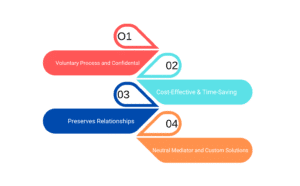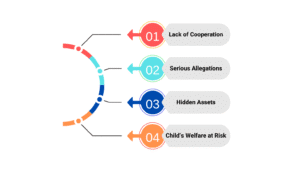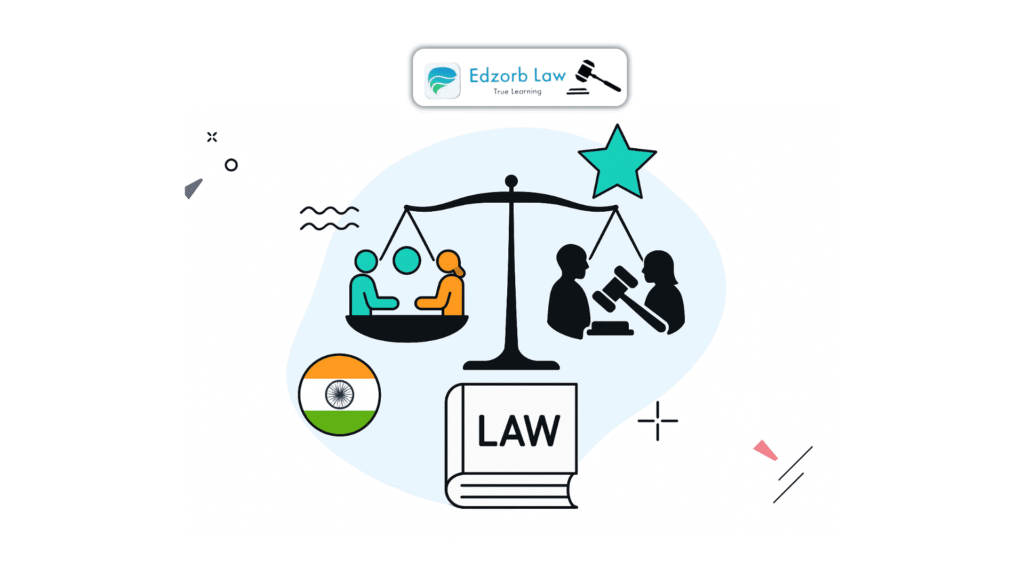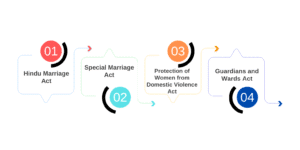Matrimonial disputes in India have traditionally been settled in courtrooms, where formal litigation dominates the resolution process. But with growing emotional, financial, and time burdens on families, there’s a sharp turn toward mediation, a confidential and collaborative alternative.
This blog demystifies mediation vs. litigation in matrimonial disputes, helping you choose the best legal route based on your personal situation, emotional needs, and legal outcomes, while following India’s current legal framework.
What is Mediation in Matrimonial Law?

Mediation is a voluntary, non-adversarial, and confidential process in which a neutral third-party mediator helps separating spouses negotiate mutually acceptable terms for separation, divorce, custody, and other family matters.
Legal Framework
Family Courts Act, 1984: Mandates judges to explore conciliation before proceeding with divorce litigation.
Mediation Bill, 2023 (Pending): Seeks to institutionalize pre-litigation mediation including for family disputes.
Process in India
Filing for mediation voluntarily or via court reference
Joint sessions with trained mediator
Drafting a settlement agreement
Agreement is submitted to court (if part of a divorce)
Key Benefits
Faster resolution (typically within 3–6 months)
Cost-effective and emotionally less draining
Private and confidential – no public record
Encourages collaborative co-parenting and respectful separation
What is Litigation in Matrimonial Disputes?
Litigation refers to the adversarial legal process where a family dispute is resolved through family courts. It involves formal petitions, legal arguments, evidence, witnesses, and a final court judgment in Matrimonial Dispute.
Common Legal Grounds
Hindu Marriage Act, 1955
Special Marriage Act, 1954
Protection of Women from Domestic Violence Act, 2005
Guardians and Wards Act, 1890 (for child custody)
Litigation Covers:
Contested divorces
Domestic violence complaints
Child custody battles
Alimony/maintenance disputes
Dowry and cruelty-related FIRs
Challenges
Time-consuming: Cases often stretch over 3–5 years
High cost: Legal fees, multiple hearings, psychological toll
Public record: Personal issues become court documents
Strained relationships: Win-lose outcomes increase animosity
Mediation vs. Litigation – A Comparison Table
| Aspect | Mediation | Litigation |
|---|---|---|
| Nature | Collaborative, interest-based | Adversarial, rights-based |
| Time | 3–6 months | 2–5 years |
| Cost | Rs. 10K – 50K approx. | Rs. 1L – 5L+ (or more) |
| Privacy | Completely confidential | Public proceedings |
| Decision-making | Mutually agreed settlement | Court-imposed judgment |
| Relationship Impact | Preserves dignity, allows closure | Often bitter and divisive |
| Ideal For | Mutual divorce, custody agreement, property settlement | Cruelty, abuse, child endangerment, serious criminal charges |
When to Choose Mediation in Matrimonial Disputes?
Mediation is ideal when:
Both parties are willing to communicate and compromise
There’s mutual agreement to divorce
There are minor children and co-parenting is desired
There’s no history of domestic violence or abuse in Matrimonial Dispute
Focus is on emotional closure, not revenge
When is Litigation the Only Option?

Litigation becomes necessary when:
One party is unwilling to cooperate or mediate
Allegations of violence, cruelty, or dowry harassment exist
Assets are hidden or not disclosed honestly
Child’s safety or custody rights are under threat
Legal enforcement is required for maintenance or injunction
Landmark Judicial Views Supporting Mediation
Afcons Infrastructure Ltd. Vs Cherian Varkey Construction (2010): Supreme Court encouraged referring family disputes to mediation.
K. Srinivas Rao Vs D.A. Deepa (2013): Emphasized the role of mediation in reducing mental cruelty.
2023 Madras HC Ruling: Directed that pre-litigation mediation must be explored in all matrimonial dispute.
Get Comprehensive Support with The Legal Joyliss
Looking for structured, end-to-end legal assistance tailored for matrimonial matters?
The Legal Joyliss specializes in practical, confidential, and client-centric solutions for:
Child Custody Agreements – Prioritizing the child’s best interest through joint or sole custody arrangements
Mutual Divorce Filing – Hassle-free mutual consent divorce with complete procedural guidance
Alimony Negotiation – Fair, transparent, and legally sound alimony and maintenance settlements
Document & Drafting Support – End-to-end help with legal notices, petitions, affidavits, and settlement deeds
Check Edzorb Law and The Legal Joyliss Now.







 Features
Features






